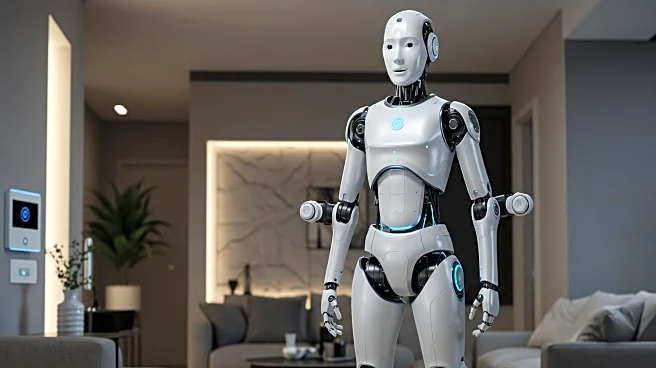What is the story about?
What's Happening?
Weave Robotics, a startup founded by former Apple engineers, has unveiled 'Isaac,' a humanoid robot designed to assist with household chores. The robot, which is priced at $59,000, is set to begin shipping to its first 30 U.S. customers in the fall of 2025. Isaac is capable of autonomously folding T-shirts and picking up cups and toys, showcasing its potential to transform home life similar to past labor-saving devices like dishwashers. Despite its high cost, the robot is available for a refundable $1,000 reservation fee, with a payment plan option of $1,385 per month for 48 months. The introduction of Isaac comes amid a growing interest in humanoid robots, highlighted by their presence at the World Robot Conference in Beijing.
Why It's Important?
The launch of Isaac represents a significant step in the evolution of household robotics, potentially altering the way domestic tasks are managed. While the high price point may limit accessibility, it underscores the technological advancements in robotics and artificial intelligence. The development of such robots could lead to increased efficiency in household management, reducing the time and effort required for mundane tasks. However, the economic feasibility of these robots remains a concern, as they may not make economic sense for most people and companies in the foreseeable future. The broader impact on industries such as home appliances and domestic services could be substantial, as these robots become more integrated into daily life.
What's Next?
As Weave Robotics prepares to ship Isaac to its initial customers, the company may face challenges in scaling production and reducing costs to make the robot more accessible to a wider audience. The success of Isaac could influence other companies to invest in similar technologies, potentially leading to increased competition and innovation in the humanoid robot market. Stakeholders, including consumers and businesses, will likely monitor the performance and reception of Isaac closely, assessing its practicality and value in real-world applications. The future of household robotics may hinge on advancements in technology that improve functionality while reducing costs.
Beyond the Headlines
The introduction of humanoid robots like Isaac raises ethical and cultural questions about the role of robots in everyday life. As these machines become more prevalent, society may need to address concerns about privacy, security, and the potential displacement of human labor. The cultural acceptance of robots performing intimate household tasks could vary significantly across different demographics and regions. Long-term shifts in societal norms and values may occur as robots become more integrated into domestic environments, challenging traditional perceptions of human-machine interactions.















